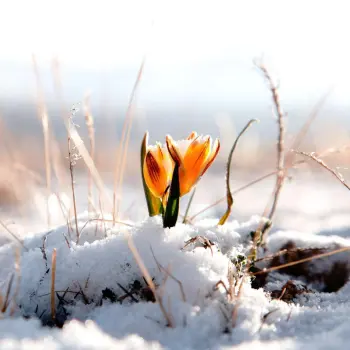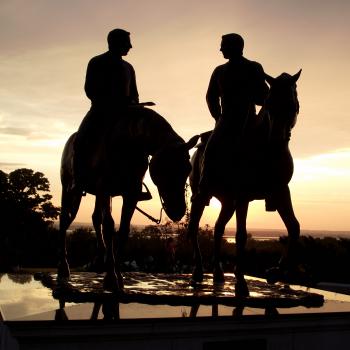Editors' Note: This article is part of the Patheos Public Square on Rites of Passage. Read other perspectives here.
My eleven-year-old self was nonplussed about the event. It was an awards ceremony in a park. I didn't know most of the people there. My attendance was a family obligation because the person receiving the award was my cousin Charles.
Yet that ceremony, that rite of passage, caught my attention in an unexpected way. It opened a chapter in my life that continues to this day, and carries forward into my son's life.
The event was a "court of honor" at which Charles received his Eagle Scout award. I could tell immediately that it was a great honor. Charles stood tall and confident — unusually confident for a boy of sixteen. His parents beamed as they affixed the Eagle medal to his uniform. Scoutmasters with patent gravitas spoke of Charles' accomplishments and his character. Other boys seemed to admire him too.
I left that ceremony wanting what Charles had. That fall, I started Scouts as a Tenderfoot. Five years later I stood for my Eagle court of honor. Now my son follows the same trail.
Receiving the Eagle meant more to me at the time than my high school graduation, more than my confirmation at church. It was meaningful because it represented a sustained effort over five years. I had to go out into the wilderness, away from my suburban home, to do difficult and sometimes scary things. I had to go before Scoutmasters to prove my skills. I had to persuade other boys to trust me as their leader.
I would venture to say that Boy Scouts do rites of passage better than any other group with which I'm familiar. It's not just the Eagle, the shining goal at the end of the path. There are rituals to escort a boy every step of the way. A six-year-old Bobcat has his badge pinned upside down until he does a good deed. When my son advanced in Cub Scouts, he crossed a bridge and was greeted on the other side by older Scouts presenting his new insignia.
The passage from Cub Scouts to Boy Scouts involves a momentous transition from adult leadership to youth leadership. Rank advancements are celebrated at courts of honor. Before each advancement, a Scout must appear before a three-member board of review. The Scout is asked to reflect on the skills he has gained, the lessons he has learned, and his plans for progress toward Eagle.
These Boy Scout rites are more than just striking ceremonies with bonfires by mountain lakes, choruses of male voices echoing off the hills, and fatherly talks about the kind of men we aim to be. They seem to make some difference in the kind of men that the boys do become. Anecdotally, I can bear witness. I recognize certain traits of character that are common in men who have been deeply involved in Scouting — for example, a calm sense of always "being prepared" for any contingency. There is research that seems to confirm that anecdotal impression.
What gives these Scouting rites their power? It has to do with the programs in which they are embedded:
- Boy Scouts sets forth a clear code of expected behavior. According to the Scout Law, "A Scout is trustworthy, loyal, helpful, friendly, courteous, kind …."
- Scouting is not afraid to convey those expectations in gendered language. It appeals to Scouts as boys on the way to manhood.
- Boy Scouts situates those expectations within ordered structures of authority and hierarchy. These structures have the power to declare that transitions have occurred in a boy's life.
- Scouting is a long journey, with Eagle as the desired destination. The goal is high but attainable.
- Scouting invites boys into "high adventure" outside their daily routines. For me and many others, the ultimate Scouting experience was an extended wilderness trek at Philmont Scout Ranch in New Mexico.
- Boy Scouts leans heavily on family bonds. Many adult Scout leaders are parents, especially fathers, who take responsibility in forming their own sons alongside the sons of other fathers.
- At the same time, Scouting emphasizes boys taking responsibility for one another. "The Cub Scout helps the pack go; the pack helps the Cub Scout grow" is a phrase taught to younger boys. Thus, advancement in Scouting is not merely an individual achievement. It also implies forward movement among a brotherhood of those sharing the same formative experiences.
- Boy Scouts has a quasi-religious element. The Scout oath and law serve as a kind of creed that is repeated at every meeting. Thanks are rendered to God before meals at Scout camps, and religious invocations are common at courts of honor. More broadly, Scouting seems still to operate under a "sacred canopy" — a presumed order in the natural and social worlds in which each individual is to find his or her proper place.




